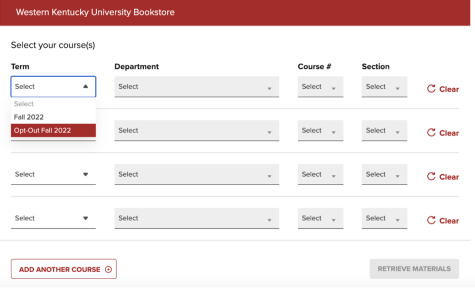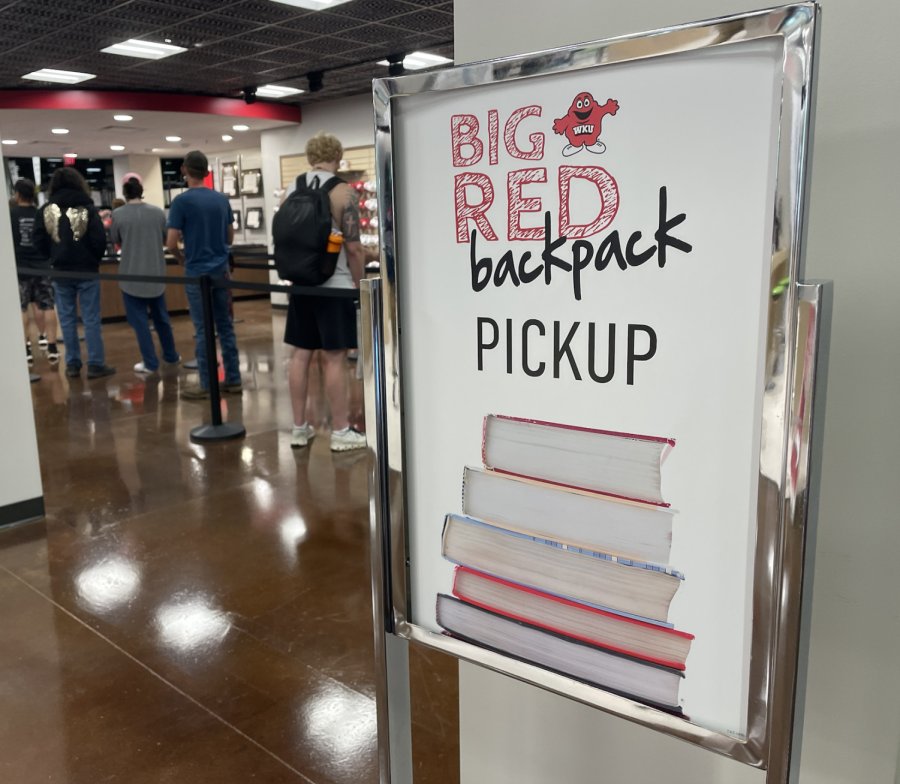Students share thoughts on new Big Red Backpack program
Students wait in line at the WKU Bookstore to pick up their Big Red Backpack materials during the first week of the fall 2022 semester.
August 26, 2022
WKU introduced the Big Red Backpack program this semester as a way students could access course materials in a more affordable way.
The program is in response to discussions from the Student Government Association on making textbooks more affordable to students, according to the program’s announcement by Provost Bud Fischer.
The program allows students to receive required course materials by the first day of classes at the cost of $24 per credit hour.
Per the program’s website, course materials eligible for the program include “instructional content, such as traditional textbooks and lab manuals, and access codes to digital content or digital textbooks.”
After registering for courses, students are automatically enrolled in the program. Students then receive an email to verify their order and select fulfillment preferences. The WKU store emails students when their order is fulfilled.
“We’re giving you the opportunity because we know that the majority of students are going to be saving,” Sarah Sears, operations manager at Barnes and Noble College, said. “We want you to take a look and then if it doesn’t benefit you, then all you have to do is an opt out form.”
Students can choose to leave the program by changing their status on the opt out form.
Per Sears, students can opt in or out of the program until this coming Monday, Aug. 29, the last day to drop or add classes. Students also have until that date to receive a 100% refund on Big Red Backpack charges.
Students who opt out can still purchase individual textbooks in person or online at the WKU bookstore, Sears said.

If purchasing through the website, students need to select “opt-out fall 2022” under the term, choose materials they need, and then pick up in store.
The program requires students to opt in or out for all courses.
“There are several reasons why it has to be an all opt in or an all opt out,” Sears said. “I would say one of the biggest is because we have to crunch those numbers in a way that if everybody is in that we can set that rate $24 a credit hour. We’re not going to be able to make that average if people are only getting one book here and there and we’re losing money on the back end.”
Sears said another reason for the policy is complications that arise with digital access when students choose which digital materials to opt in or out of.
According to Sears, many students who had initially decided to opt out of the program have returned to the bookstore to opt back in after finding out that the program would save them money.
Sears said she received positive feedback from a professor who was pleased that a program he wanted to utilize only cost his students $72 when it initially would have cost around $200.
Sears said students have adjusted well to the program so far, and the bookstore has been able to distribute material earlier than before.
“I think the learning curve is pretty deep the first go around, but I think every semester it will get easier and easier,” Sears said.
Isabel Gray, an engineering major, decided to opt into the Big Red Backpack program due to its cost and convenience.
Gray compared the cost of renting her books from an outside source with the cost of the program and found that it would be cheaper for her to opt into the program.
“I think that for science and engineering majors the Big Red Backpack program is really helpful because a lot of the textbooks are very expensive and they are required for the majority of my classes,” Gray said.
One way Gray believes the program could improve is by offering students a way to directly compare the cost of the program with the cost of purchasing from outside sources such as Amazon.
“I think it’s been effective for me, but I also encourage students to check it out before they decide to opt in,” Gray said.
Christian Butterfield, an English and international affairs major, decided to opt out of the program.
After crunching the numbers, Butterfield found that he could purchase his materials at a cheaper price than the $24 per credit hour cost the program entails.
“One worry that I have with the decision to make it opt out rather than opt in is that it encourages students to understand it as the best possible option,” Butterfield said. “I do think for some students it is financially reasonable and saving them money, and for some students it’s not.”
Butterfield said the program is likely to affect first-generation students or students without existing connections in college the most. The program is a step towards trying to address the financial issues students face with materials, but Butterfield said the bigger problem lies within the textbook market itself.
“I think that we as an institution can’t necessarily bypass the fact that textbook pricing is predatory, but I think that we can make small systemic change, especially on the class level, to try to promote students being able to afford the text,” Butterfield said. “Not being able to afford the text is the last thing that should stop a student from education.”
Staff reporter Madison Carter can be reached at [email protected].












